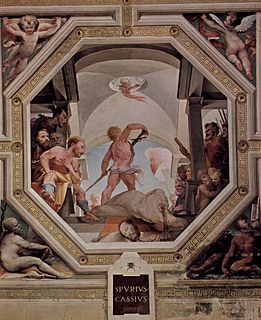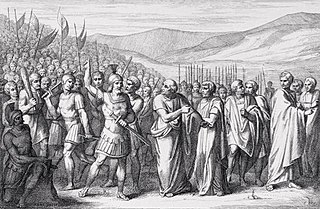
The decemviri or decemvirs were any of several 10-man commissions established by the Roman Republic.

Spurius Cassius Viscellinus or Vecellinus was one of the most distinguished men of the early Roman Republic. He was three times consul, and celebrated two triumphs. He was the first magister equitum, and the author of the first agrarian law. The year following his last consulship, he was accused of aiming at regal power, and was put to death by the patricians.
Lucius Valerius Potitus was a patrician who, together with Marcus Horatius Barbatus, opposed the second decemvirate in 449 BC when that body showed despotic tendencies. In honor of their efforts, the pair were elected consuls for the remainder of that year.
Tribunus plebis, rendered in English as tribune of the plebs, tribune of the people or plebeian tribune, was the first office of the Roman state that was open to the plebeians, and was, throughout the history of the Republic, the most important check on the power of the Roman Senate and magistrates. These tribunes had the power to convene and preside over the Concilium Plebis ; to summon the senate; to propose legislation; and to intervene on behalf of plebeians in legal matters; but the most significant power was to veto the actions of the consuls and other magistrates, thus protecting the interests of the plebeians as a class. The tribunes of the plebs were sacrosanct, meaning that any assault on their person was punishable by death. In imperial times, the powers of the tribunate were granted to the emperor as a matter of course, and the office itself lost its independence and most of its functions. During the day the tribunes used to sit on the tribune benches on the Forum Romanum.
The Lex Licinia Sextia, also known as the Licinian Rogations, was a series of laws proposed by the tribunes of the plebs, Lucius Sextius Lateranus and Gaius Licinius Stolo. These laws provided for a limit on the interest rate of loans and a restriction on private ownership of land. A third law, which provided for one of the two consuls to be a plebeian, was rejected. Two of these laws were passed in 368 BC, after the two proponents had been elected and re-elected tribunes for nine consecutive years and had successfully prevented the election of patrician magistrates for five years. In 367 BC, during their tenth tribunate, this law was passed. In the same year they also proposed a fourth law regarding the priests who were the custodians of the sacred Sibylline Books.
Lucius Sextius Lateranus was a Roman tribune of the plebs and is noted for having been one of two men who passed the Leges Liciniae Sextiae of 368 BC and 367 BC. Originally, these were a set of three laws. One law provided that the interest already paid on debts should be deducted from the principal and that the payment of the rest of the principal should be in three equal annual installments. Another one provided restricted individual ownership of public land in excess of 500 iugeras and forbade the grazing of more than 100 cattle on public land. The most important law provided that one of the two consuls be a plebeian. Having been reelected nine times, Lucius Sextius Lateranus and Gaius Licinius Stolo held the plebeian tribunate for ten years. In 368 BC the laws regarding debt and land were passed, but the law regarding the consulship was rejected. In 367 BC this law was passed. In the same year the two tribunes of the plebs proposed a fourth law concerning the priests who were the custodians of the sacred Sibylline Books, and Lucius Sextius Lateranus was elected to serve as consul for the year 366 BC. Livy wrote that he was "the first of the plebeians to attain that honour."
Lucius Minucius Esquilinus Augurinus was a Roman politician in the 5th century BC, consul in 458 BC, and decemvir from 450 to 449 BC.
Secessio plebis was an informal exercise of power by Rome's plebeian citizens, similar in concept to the general strike. During the secessio plebis, the plebs would abandon the city en masse in a protest emigration and leave the patrician order to themselves. Therefore, a secessio meant that all shops and workshops would shut down and commercial transactions would largely cease. This was an effective strategy in the Conflict of the Orders due to strength in numbers; plebeian citizens made up the vast majority of Rome's populace and produced most of its food and resources, while a patrician citizen was a member of the minority upper class, the equivalent of the landed gentry of later times. Authors report different numbers for how many secessions there were. Cary & Scullard state there were five between 494 BC and 287 BC.
Appius Claudius Sabinus Regillensis or Inregillensis was the legendary founder of the Roman gens Claudia, and consul in 495 BC. He was the leading figure of the aristocratic party in the early Roman Republic.
Publius Postumius Tubertus, the son of Quintus, was the first of the patrician gens Postumia to obtain the consulship, which he held in 505 BC, and again in 503. Ten years later, he was one of the envoys sent by the Roman Senate to negotiate with the plebeians during the first secessio plebis. The outcome of those negotiations reunited the Roman people, and established the tribunes of the plebs, one of the most important institutions of the Roman Republic.
The gens Menenia was a very ancient and illustrious patrician house at Rome from the earliest days of the Roman Republic to the first half of the fourth century BC. The first of the family to obtain the consulship was Agrippa Menenius Lanatus in 503 BC. The gens eventually drifted into obscurity, although its descendants were still living in the first century BC.
Titus Cloelius Siculus was a Roman statesman of the early Republic, and one of the first consular tribunes in 444 BC. He was compelled to abdicate after a fault was found during his election. Two years later he was one of the founders of the colony of Ardea.

The gens Sicinia was a plebeian family at ancient Rome. Members of this gens occur throughout the history of the Republic, but only one of them obtained the consulship, Titus Sicinius Sabinus in 487 BC. Throughout the long Conflict of the Orders, the Sicinii were celebrated for their efforts on behalf of the plebeians.
Marcus Minucius Augurinus was a Roman Republican politician of the patrician gens Minucia during the beginning of the 5th century BC. He served as Consul of Rome in 497 BC and 491 BC, both times serving together with Aulus Sempronius Atratinus.
Titus Quinctius Capitolinus Barbatus was a Roman statesman and general who served as consul six times. Titus Quinctius was a member of the gens Quinctia, one of the oldest patrician families in Rome.

The first secessio plebis was a significant event in ancient Roman political and social history that occurred between 495 and 493 BC. It involved a dispute between the patrician ruling class and the plebeian underclass, and was one of a number of secessions by the plebs and part of a broader political conflict known as the conflict of the orders.
The Valerio-Horatian Laws were three laws which were passed by the consuls of Rome for 449 BC, Lucius Valerius Potitus and Marcus Horatius Barbatus. They restored the right of appeal to the people and introduced measures which were favourable to the plebeians. The consuls' actions came after a plebeian rebellion, the second plebeian secession, which overthrew the second decemvirate, which had ruled tyrannically. The two consuls had shown sympathy towards the plebeians and, as a result, had been chosen to negotiate the resolution of the rebellion. Their new laws quelled the plebeian unrest.
Titus Menenius Lanatus was a Roman patrician of the fifth century BC. He was elected consul for the year 477. He unsuccessfully fought the Veiientes, and was later prosecuted by the tribunes of the plebs for his failure to prevent the disaster of the Cremera.
Appius Claudius Ap. f. M. n. Sabinus Regillensis, was a member of the great patrician house of the Claudii at Ancient Rome. He held the consulship in 471 BC.
The gens Genucia was a prominent family of the Roman Republic. It was probably of patrician origin, but most of the Genucii appearing in history were plebeian. The first of the Genucii to hold the consulship was Titus Genucius Augurinus in 451 BC.




